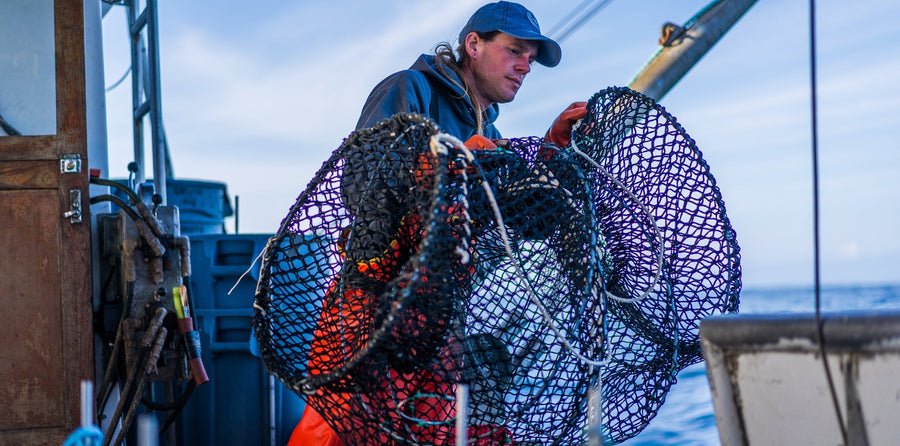
Our co-op’s fishermen helped develop slinky pots to create a cleaner sablefish (black cod) fishery.
Over the course of 15 years, Seafood Producers Cooperative (SPC) fishermen worked to create a solution to sperm whale depredation of their black cod catch and this made for a cleaner fishery with a higher quality catch.
Previously, our small boat hook and line fishermen were losing a lot of their sablefish catch, their bait, and sometimes some of their gear when sperm whale would learn to listen for the sounds of a boat’s hydraulics hauling the gear with hooks and fish on board. Upon hearing the gear being hauled, the whales would then come in to take black cod off the hooks to feed themselves. What became a free meal for the whales left fishermen without bait, gear, and their catch. This whale depredation of the caught black cod turned into a nasty cycle, leaving fishermen broke and whales dependent on following fishermen around the ocean.
Catching black cod in a simple contraption called a pot, which are typically used for crabbing and shrimping, makes it difficult for the whales to slurp up the fishermen’s catch. However, pots used to be too big for a small boat to adequately haul, and pots were not permitted for the hook and line fishery. Our fishermen worked with manufacturers to create a collapsible pot that was light and easier to use on smaller boats without major investments in new equipment, a constant concern for small boat fishermen. They also worked on getting these slinky pots okay-ed for their fishery, too.

The benefits of these slinky pots to fishermen (and others too) are numerous:
1) Should the weather change, fishermen can leave the pots and anchor up to avoid weather danger. Safety first!
2) No need to run to shallower water, thus saving fuel. One of the whale avoidance tactics used in the past was running to shallower water after a boat sets gear in the hopes that the whales would get distracted waiting for them to haul the gear back up. Without having to run to shallow water, fishermen save a lot of fuel.
3) All catch comes up alive, producing higher quality black cod while also reducing bycatch. Hook and line fisheries do not have a lot of bycatch but a common bycatch species is rockfish and reducing bycatch of rockfish by 40% is key because rockfish is a much slower reproducing fish than black cod.
See what fishing for sablefish using the slinky pots looks like in this video.
The fishermen-owners of SPC work together to continue making improvements for small boat fishermen so that they can fish sustainably and sustain their livelihoods. We believe that having the cleanest possible fishery makes for sustainable seafood. We define sustainable seafood as fish coming from a well-managed fishery, with scientifically assessed stocks, which results in minimal bycatch and minimal destruction of ocean habitat. Another aspect of sustainable seafood is tracing each fish back to the boat that caught it, which you can check out here.
Or, in other words, sustainable seafood means that our grandchildren can fish and live the same lifestyle we do if they so choose.




